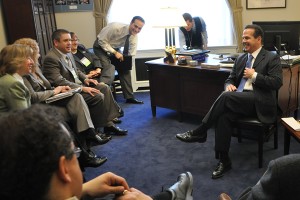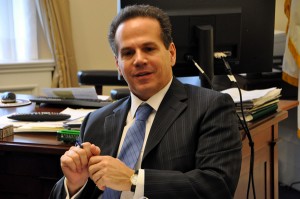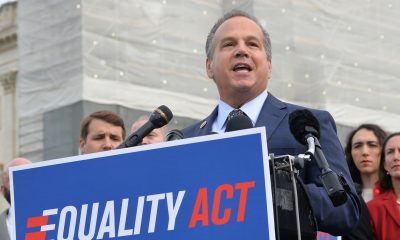National
Adjusting to freshman life on the Hill
Gay Rep. Cicilline on being in the minority, the prospects for a pro-LGBT omnibus bill — and D.C.’s social scene

As Rep. David Cicilline (D-R.I.) and his fellow House Democrats are discovering, being in the minority is rough.
The freshman lawmaker — and fourth sitting openly gay member of Congress — offers help to the best of his abilities to a group of disability advocates from his district, but knows his influence is limited with U.S. House Speaker John Boehner (R-Ohio) running the chamber and pledging to slash billions from government programs.
The Blade spent a day shadowing Cicilline last week. Six weeks into his first term as a member of Congress, he meets with about a dozen constituents working on disability issues in his office at the Cannon Office Building.
The meeting is one of four today for the Providence, R.I., mayor-turned-member of Congress, which is a typical load for Cicilline. Among his planned meetings is a talk with gay Rhode Island State House Speaker Gordon Fox, a leader in the fight to legalize same-sex marriage in the Ocean State.
But for this meeting, Cicilline listens intently as the advocates voice their concerns and hand him data sheets on problems facing the disabled and potential cuts to government programs.
Donna Martin, executive director of Rhode Island’s Community Provider Network, asks the lawmaker to push for continued funding for Medicaid programs through appropriations to the Department of Health & Human Services.
“The FMAP, the federal Medicaid match, the increased FMAP percentage is due to expire at the end of June,” she says. “That is going to have a tremendous impact on Rhode Island, specifically on our services. We are asking for consideration that those funds be extended until [health care reform] can be implemented — a provision in [health care reform] that expands the Medicaid safety net, if you will, which is active in 2014.”
Martin acknowledges that the Republican-controlled House doesn’t have “a whole lot of appetite” for talking about the extension of Medicaid funds, but emphasizes the importance of the program.
“It is a piece that has managed to keep many of these organizations afloat,” she says.
The disruptive noise of a loud conversation is heard from an adjoining room. Ever the attentive host, Cicilline rises from his seat to shut the door to his office.
Meanwhile, Jack Padien, CEO of Arc of Blackstone Valley, discusses the need for continued funds for the Department of Housing & Urban Development and Section 811 programs, which provide housing for low-income people with disabilities.
“The concern is, and I’m sure the concern with you and everyone else on the Democratic side, is that the Republicans have just put in a $63 billion cut — proposed cut — and that takes out a lot of things,” he says. “It would be devastating to take out $250 million out of a $300 million budget for low-income housing.”
Clad in a pinstripe suit, French cuffs and Italian loafers, Cicilline articulates his response in his distinctively raspy voice, starting with a comparison of President Obama’s fiscal year 2012 budget request to what the Republicans are proposing.
“If you look at the president’s budget — I mean, there are many things in that budget that I don’t agree with,” he says. “There’s some cuts in programs that I know are good programs, but the distance between the president’s budget and what the Republicans are proposing are just night and day.”
Cicilline cites figures that the Republican proposal would cost 80,000 jobs and, by comparison, says the president’s budget would be effective in reducing the deficit and spending while providing funds for infrastructure and education.
“It’s what families would use by tightening the belt by taking out the things that aren’t working and you don’t need, but also continue to invest in things that your family needs for its future security,” Cicilline says.
The freshman pledges to work hard to pass the president’s agenda in the House, but says he suspects Democrats won’t be able to accomplish that while being in the minority.
“It’s going to depend a lot on the role the Senate plays and how we stop some of this because I think the House Republicans are going to pass something, which, I think, everybody in this room would find really unacceptable,” he says.
As a final request, Cicilline asks for specific examples of how cuts proposed by Republicans would cost jobs or harm programs that rely on federal programs.
“We talk about it in public hearings — $2 billion we cut here or $5 billion here,” Cicilline says. “That much money? It should get cut. And I think to the extent that you can provide me, ‘Look if this program is cut in half, 25 less people will be enrolled in this service and we’ll have to close that,’ that would be very useful both in terms of making the case to other colleagues and also just describing to people back home what the consequences of the Republican budget would mean.”
The meeting concludes with a group photo of Cicilline and the Rhode Island constituents who sat in on the meeting. Staffer Brad Greenburg is poised to take the photo, although Cicilline has to remind him to remove the cap from the lens before hitting the flash button.
The theme of Republicans working to slash funds from programs while Democrats urge for continued appropriations is a common one lately.
On Tuesday, as the House debates a resolution to continue funds for the remainder of the fiscal year, Cicilline takes to the floor to denounce cuts Republicans are proposing.
“The Republicans are moving forward with a dangerous spending bill, one that continues to give rewards to the rich and literally guts the initiatives most meaningful to middle class families,” Cicilline says. “Simply put, the Republicans’ spending bill is irresponsible and tone deaf to the needs of a healing nation.”
Cicilline says the Republican spending proposal would cut Pell Grants by $800 per student and kick more than 200,000 children out of Head Start. Additionally, he says the measure would undermine domestic security by eliminating 1,330 police officers and 2,400 firefighters throughout the country.
“The work of reducing our deficit and controlling spending will be hard, to be sure,” Cicilline says. “The fact of the matter is that we have to cut spending. But we have to do it responsibly. We cannot cut what makes us competitive and what helps us to innovate, to succeed in the global economy, and ultimately to create jobs.”
But in the end, the Republicans have their way on the continuing resolution. On Saturday, the House passes a measure with $61 billion in cuts from last year’s spending levels by a vote of 235-189.
The legislation now heads to the Democratic-controlled Senate, and a failure of both chambers to reach an agreement by March 4 could result in the shutdown of the U.S. government.
Following the vote, Boehner commends the House for passing the continuing resolution with reduced spending, noting, “the House works best when it is allowed to work its will.”
“This week, for the first time in many years, the People’s House was allowed to work its will — and the result was one of the largest spending cuts in American history,” Boehner says in a statement. “We will not stop here in our efforts to cut spending, not when we’re broke and Washington’s spending binge is making it harder to create jobs.”
Learning the ropes
After his constituents leave his office, Cicilline removes his jacket and retires behind his desk as he prepares for his interview with this reporter.
Papers and folders are neatly piled in different stacks. Also on his desk is a copy of “The American Way to Change” by Shirley Sagawa and “George Washington’s Sacred Fire,” a biography on the first president by Peter Lilback.
 Adorning his wall is a large green abstract painting by Tom Sgorous, a Rhode Island artist. On a nearby table, a glass bowl is displayed with the inscription, “Italio-American Club Man of the Year 2003 — Mayor David Cicilline.”
Adorning his wall is a large green abstract painting by Tom Sgorous, a Rhode Island artist. On a nearby table, a glass bowl is displayed with the inscription, “Italio-American Club Man of the Year 2003 — Mayor David Cicilline.”
During his six weeks in office, Cicilline has been busy hiring staff and setting up offices both in D.C. and in Rhode Island’s 1st congressional district. He’s also been serving on the policy steering committee to set the House Democratic agenda for the 112th Congress.
“I’ve been really learning how Congress operates and how I can have the greatest impact as a new member and as a freshman in the minority,” Cicilline says.
He made the trip from Rhode Island to D.C. solo. Asked whether he has a partner, he says he’s single.
“You’re asking me that right after Valentine’s Day?” he jokes. “How cruel!”
Still, Cicilline says he’s already visited at least one local gay bar since arriving in the District, although he can’t immediately recall the name of the establishment he visited last week.
When asked if it could have been Cobalt, Nellie’s or JR.’s, he quickly interrupts. “JR.’s,” Cicilline exclaims as he snaps his fingers. “It was just like a bar, bar. I met a friend from Rhode Island for a drink who works here in Washington.”
But focusing on the business before him on Capitol Hill, Cicilline says his top legislative priority is passage of what he calls the “Made in America” block grant.
As he envisions it, the legislation would encourage companies to keep manufacturing jobs in the United States by providing $2 billion in funds to retrofit factories, retrain workers and buy new equipment.
“I think one of the things that we have to do to really rebuild the economy in this country is start making things again and selling them in the global market,” he says.
Cicilline says he’s already spoken with House Minority Leader Nancy Pelosi (D-Calif.) about the “Made in America” block grant, which he says she supports.
Figuring out how to advance LGBT issues is also on the agenda. Upon his swearing in, Cicilline became a co-chair of the LGBT Equality Caucus and is learning from more senior openly gay members of Congress — Reps. Barney Frank (D-Mass.), Tammy Baldwin (D-Wisc.) and Jared Polis (D-Colo.) — about where to focus their attention.
Cicilline emphasizes that he’s new to Congress and learning about the legislative priorities for the LGBT community, but knows that with Boehner as presiding officer of the House, moving forward will be challenging to say the least.
“But this is the year when it’s going to be very, very difficult — maybe impossible — to make progress on most of our issues,” he says. “We’re going to be very defensive mostly. Protecting the progress we’ve made and try to prevent the clock from turning back with Republican leadership in the House.”
Cicilline says he isn’t sure what kind of anti-gay measures, if any, the Republicans might pass out of the House, but expresses confidence that the Democratic-controlled Senate would block any such initiatives from reaching Obama’s desk.
One item that has Cicilline’s interest is comprehensive legislation that would roll all pro-LGBT initiatives — such as the Employment Non-Discrimination Act, the Uniting American Families Act and repeal of the Defense of Marriage Act — into one piece of legislation.
“One of the things I’d like to explore is this idea of developing an omnibus bill that contains many of the specific pieces of legislation that have been on our agenda for a number of years and put them together in a comprehensive equality measure for the LGBT community,” Cicilline says. “I’d like to obviously talk to my colleagues about that as a strategy versus individual bills.”
But what to do about ENDA, one of the LGBT community’s top outstanding legislative priorities? What’s the best way to draw attention to the issue of job discrimination in the interim as Republican control of the House makes passage of the legislation unlikely for at least two years?
Cicilline notes as a legislator in the Rhode Island State House, he worked to help pass legislation that would bar discrimination in the state against LGBT people in situations of housing, credit, public accommodations and employment.
The Rhode Island lawmaker says the best way to draw attention to the lack of employment protections for LGBT people is to showcase people who’ve been wronged under current law.
“I think people are really fair-minded,” he says. “Most people if you sat them down and said, ‘Someone who’s working everyday and goes to work and is doing their job, their employer can say, ‘You want what? I’m firing you because you’re gay.”‘ Most people would say, “That’s wrong!” They would be surprised even to learn you can do that.”
Tongues are also wagging about another LGBT march on Washington in 2012 as a means to draw attention to LGBT issues and energize the Democratic base in the upcoming election. Still, Cicilline says he thinks resources could be better spent on constituents encouraging their members of Congress to support pro-LGBT initiatives.
“I guess you could get lots of people to march on Washington,” he says. “I just assume they were door-knocking for progressive candidates that support marriage equality, but if they’re willing to do both, I think it’s fine.”
Cicilline has landed choice committee assignments, including seats on the Small Business and Foreign Affairs committees. The lawmaker says he hopes his position on the panel overseeing international affairs will give more visibility to “the hideous treatment of LGBT members all over the world.”
For example, Cicilline says he hopes he can build awareness about the plight of LGBT people in Uganda, where activist David Kato was murdered in January and a bill that would institute the death penalty is pending before parliament.
“I think we need to be sure that we have hearings on the issue,” Cicilline says. “I’ll be raising awareness and using my role on the foreign affairs committee to work to develop a strong U.S. policy against that.”
Earlier in the week, Cicilline met with Frank Mugisha, an LGBT Ugandan activist and executive director of Sexual Minorities Uganda.
Another LGBT agenda item that’s important to Cicilline: the advancement of same-sex marriage. Rhode Island is among a few states seeing progress this year on relationship recognition for same-sex couples.
Cicilline says he’s “very much” glued to the legislative effort to pass marriage legislation in Rhode Island and believes “the prospects are very good this year” for enactment of such a measure.
“I think there is strong support from the House leadership and from the members,” he says. “The challenge is to make sure that it comes out of the House strongly because I think the fight is in the Senate.”
Cicilline adds that Gov. Lincoln Chafee’s (I) support for the marriage bill “is a big changer” from when former Republican Gov. Donald Carcieri, who opposes marriage rights for gay couples, was running the state.
But what about Obama’s position on same-sex marriage? The president has said his position could evolve on the issue and that he’s wrestling with the idea of same-sex marriage, but he hasn’t yet endorsed marriage rights for same-sex couples.
“I think the president is being very honest about his thinking that — and I take him at his word — that his position is evolving,” Cicilline says. “I think marriage equality is the right answer because it shows that every single American has access to this important institution.”
Cicilline dismisses the notion that Obama’s lack of support for same-sex marriage has a significant impact on legislative efforts to enact marriage rights for gay and lesbian couples in Rhode Island.
“I think legislators in Rhode Island will make up their minds on the issue of marriage equality based on their own view on it and by listening to constituents on it,” he says. “I’m not sure that the president’s position will have a direct impact on that.”
He adds that he doesn’t have any way of knowing whether Obama will come to support same-sex marriage, but has high hopes the president will come around.
“Everything that I know about him leads me to believe that he will look very strongly at equality and justice and ending discrimination of any kind,” Cicilline says. “So, I would hope that the conclusion of his thinking will also get him to where he supports marriage equality.”
With his Blade interview complete, Cicilline moves on to the rest of the day’s meetings. However, his schedule isn’t limited to private meetings with constituents.
Busy day on the Hill
Cicilline is scheduled to hear testimony in the afternoon as part of the House Small Business Committee. The title of the hearing is “Putting Americans Back to Work: The State of the Small Business Economy.”
The Republicans who control the committee — and the GOP-chosen witnesses — use the hearing to denounce the Obama administration’s policies.
House Small Business Committee Chair Sam Graves (R-Mo.) plays up the trials that small businesses face in the United States even in times when the economy is prosperous.
“Even though there has been recent signs that our economy is starting to improve, our recovery from this recession remains sporadic at best,” Graves says. “As we’ve said many time before, small businesses need certainty for plan for not only the next day but also the next month and the next year.”
Graves also takes a dig at the health care reform law passed by the 111th Congress. Repealing or defunding the initiative has been a priority of Republican leadership in the current Congress.
“After the new health care law passed last year, I heard from countless small businesses in my district and right here in this committee room that not only will this new law fail to provide health care benefits to employees, but the costs will put them out of business,” Graves said.
The Republican-appointed witnesses offer testimony bemoaning practices the Obama administration has put in place.
Representing the U.S. Chamber of Commerce — known for its hostility to the president — is Bill Feinberg, president of Allied Kitchen and Bath, Inc., in Fort Lauderdale, Fla., who blasts the health care reform law.
“I know that in 2014 the new employer mandate starts — the mandate says an employer with 50 or more employees must offer government-approved health insurance or pay steep fines,” he says. “Wouldn’t incentives, rather than penalties, have been a better way to send the message that government and businesses can work together?”
Dixie Kolditz, owner of Open-Box Creations in Cathlament, Wash., says regulations that the Obama administration has put in place are stifling her import business.
“We have had to be creative and make our money stretch more than it used to,” she says. “This becomes harder when there are expected and unexpected regulations and hidden government taxes and fees.”
Cicilline arrives at the committee hearing after the witnesses have given their opening statements. Taking his seat on the dais — far to the end in accordance with his freshman status — the lawmaker dons a pair of spectacles and presumably reads the written testimony submitted by witnesses.
When Graves gives Ciclline the green light to begin his questioning, he starts by expressing his interest in growing small businesses in the United States.
“I think we’re all very interested in what we need to do to make small business grow and to create more jobs,” Cicilline says. “So, I’m interested in specifics — because I understand the feeling that you may have of small business being overregulated and overburdened, but to be helpful in terms of coming to address that, I need to understand what the specifics are.”
Beginning his questioning with Feinberg, Cicilline notes the small business owner already provides health care benefits to employees, even though he is not required to do so.
“I presume you do that because you decided it’s valuable to have employees who are healthy and well and can be productive,” Cicilline says.
“My employees are my partners,” Feinberg says. “That’s what grows my business.”
Cicilline presses Feinberg on whether the entrepreneur thinks “it’s a good idea” to have a system in place that provides affordable health care to small businesses.
“I can’t say whether or not,” Feinberg says. “As a business owner, I look at what’s going to grow my business. Knowing that I have to provide insurance — that limits me. That does not give me the flexibility as a business owner that I think is required to grow my business.”
Following up, Cicilline asks whether he’s aware that he’s entitled to a tax credit in exchange for providing health insurance to at least 50 employees. Feinberg says he’s aware of the law.
“The reason I ask that is that I think it’s important that we also at the [Small Business Administration] or relevant federal agencies should share that information with small businesses,” Cicilline says. “The tax cut is designed to help small business and make providing health care affordable, so I think that’s an important responsibility.”
On his way out of the hearings, Cicilline tells the Blade he realizes the committee lineup was orchestrated to favor Republican policy.
“The witnesses are clearly invited by the majority party, so I think they have a very clear view on what they think about some of those issues that was reflected in the witnesses,” Cicilline says.
Cicilline heads back to his office, but not before a constituent approaches and asks for a picture with him. This reporter complies with a request to take a photo of the two, then watches as the Rhode Island lawmaker heads back to the Cannon House Office Building to continue his work.
The White House
As house Democrats release Epstein photos, Garcia continues to demand DOJ transparency
Blade this week sat down with gay House Oversight Committee ranking member

Democrats on the House Oversight Committee have released new photos from Jeffrey Epstein’s email and computer records, including images highlighting the relationship between President Donald Trump and the convicted sex offender.
Epstein, a wealthy financier, was found guilty of procuring a child for prostitution and sex trafficking, serving a 13-month prison sentence in 2008. At the time of his death in prison under mysterious circumstances, he was facing charges of sex trafficking and conspiracy to traffic minors.
Among those pictured in Epstein’s digital files are Trump, former President Bill Clinton, former Trump adviser Steve Bannon, actor and director Woody Allen, economist Larry Summers, lawyer Alan Dershowitz, entrepreneurs Richard Branson and Bill Gates, and Andrew Mountbatten-Windsor.
One photo shows Trump alongside Epstein and a woman at a Victoria’s Secret party in New York in 1997. American media outlets have published the image, while Getty Images identified the woman as model Ingrid Seynhaeve.
Oversight Committee Democrats are reviewing the full set of photos and plan to release additional images to the public in the coming days and weeks, emphasizing their commitment to protecting survivors’ identities.
With just a week left for the Justice Department to publish all files related to Epstein following the passage of the Epstein Files Transparency Act, which requires the Justice Department to release most records connected to Epstein investigations, the Washington Blade sat down with U.S. Rep. Robert Garcia (D-Calif.), the ranking member on the Oversight Committee to discuss the current push the release of more documents.
Garcia highlighted the committee’s commitment to transparency and accountability.

“We’ve said anything that we get we’re going to put out. We don’t care who is in the files … if you’ve harmed women and girls, then we’ve got to hold you accountable.”
He noted ongoing questions surrounding Trump’s relationship with Epstein, given their long history and the apparent break in friendship once Trump assumed public office.
“There’s been a lot of questions about … Donald Trump and Jeffrey Epstein. They were best friends for 10 years … met women there and girls.”
Prior to Trump’s presidency, it was widely reported that the two were friends who visited each other’s properties regularly. Additional reporting shows they socialized frequently throughout the 1990s and early 2000s, attending parties at Trump’s Mar-a-Lago resort in Florida and Epstein’s residences. Flight logs from an associate’s trial indicate Trump flew on Epstein’s private jet multiple times, and Epstein claimed Trump first had sex with his future wife, Melania Knauss, aboard the jet.
“We’ve provided evidence … [that leads to] questions about what the relationship was like between Donald Trump and Jeffrey Epstein.”
Garcia stressed the need for answers regarding the White House’s role in withholding information, questioning the sudden change in attitude toward releasing the files given Trump’s campaign promises.
“Why is the White House trying to cover this up? So if he’s not covering for himself … he’s covering up for his rich friends,” Garcia said. “Why the cover up? Who are you hiding for? I think that’s the question.”
He confirmed that Trump is definitively in the Epstein files, though the extent remains unknown, but will be uncovered soon.
“We know that Trump’s in them. Yeah, he’s been told. We know that Trump’s in them in some way. As far as the extent of it … we don’t know.”
Garcia emphasized accountability for all powerful figures implicated, regardless of financial status, political party, or personal connections.
“All these powerful men that are walking around right now … after abusing, in some cases, 14‑ and 15‑year‑old girls, they have to be held accountable,” he said. “There has to be justice for those survivors and the American public deserves the truth about who was involved in that.”
He added that while he is the ranking member, he will ensure the oversight committee will use all available political tools, including subpoenas — potentially even for the president.
“We want to subpoena anyone that we can … everyone’s kind of on the table.”
He also emphasized accountability for all powerful figures implicated, regardless of financial status, political party, or relationship with the president.
“For me, they’re about justice and doing the right thing,” Garcia said. “This is about women who … were girls and children when they were being abused, trafficked, in some cases, raped. And these women deserve justice.”
“The survivors are strong.”
Deputy White House Press Secretary Abigail Jackson issued a statement regarding the release the photos, echoing previous comments from Republicans on the timing and framing of the photos by the Oversight Committee.
“Once again, House Democrats are selectively releasing cherry-picked photos with random redactions to try and create a false narrative,” Jackson said.
“The Democrat hoax against President Trump has been repeatedly debunked and the Trump administration has done more for Epstein’s victims than Democrats ever have by repeatedly calling for transparency, releasing thousands of pages of documents, and calling for further investigations into Epstein’s Democrat friends,”
In a press release on Friday, Garcia called for immediate DOJ action:
“It is time to end this White House cover-up and bring justice to the survivors of Jeffrey Epstein and his powerful friends. These disturbing photos raise even more questions about Epstein and his relationships with some of the most powerful men in the world. We will not rest until the American people get the truth. The Department of Justice must release all the files, NOW.”





(Photo courtesy of the U.S. House Oversight Committee)
The White House
White House deadnames highest-ranking transgender official
Rachel Levine’s portrait altered at HHS

Admiral Rachel Levine — the first transgender person ever confirmed by the U.S. Senate and the highest-ranking trans official in American history — had her official portrait in the Humphrey Building altered, with staff replacing her correct name with her deadname, the name she has not used since 2011.
NPR first reported the change, and an HHS spokesperson confirmed to the outlet that Levine’s portrait had recently been altered. A digital photograph obtained by NPR shows Levine’s former (male) name typed on a placard beneath the portrait, placed under the glass of the frame.
Levine served as a four-star admiral in the U.S. Public Health Service Commissioned Corps under the Biden-Harris administration and was appointed the 17th assistant secretary for health.
During her tenure, Levine oversaw the Commissioned Corps and helped lead national public-health initiatives, including the federal COVID-19 response and vaccination strategy; efforts to address rising syphilis infection rates; HIV/AIDS prevention and treatment programs; and strategies to combat the opioid epidemic, particularly through expanded harm-reduction approaches for the communities most affected.
The Trump-Vance administration’s decision to publicly deadname Levine is widely viewed within the trans community as demeaning and disrespectful. The move comes amid a series of federal policy reversals targeting LGBTQ Americans, particularly trans youth seeking gender-affirming care.
Those actions include: weakening workplace protections for LGBTQ employees; limiting restroom access; downgrading gender-identity discrimination cases; pressuring hospitals to end gender-affirming care; cutting HIV research and prevention funding; removing LGBTQ crisis resources; restricting access to trans-inclusive medical policies for veterans and young people; supporting trans sports bans and threatening funding for teams that include trans athletes; and forcing schools and universities to eliminate DEI and LGBTQ offices, inclusive curricula, gender-neutral bathrooms, and books or training materials addressing LGBTQ issues.
The Trump–Vance administration has also expanded federal censorship by removing LGBTQ language from surveys, agency websites, Smithsonian materials, and human-rights reports; blocking Pride recognitions; creating federal communications that misgender trans women; imposing passport and travel barriers for trans Americans; lifting protections for trans service members; limiting benefits and care for LGBTQ veterans; and pressuring states, universities, and hospitals to end trans-inclusive policies under threat of losing federal research, education, or Medicaid funds. The administration has additionally deported LGBTQ asylum seekers to unsafe conditions, removed LGBTQ issues from global human-rights reporting, and escalated anti-trans rhetoric at public events.
These actions stand in stark contrast to Levine’s public-health record. As assistant secretary for health, she worked to expand LGBTQ+ health data collection, promote equitable vaccine distribution, strengthen national health-equity initiatives, and reduce care disparities experienced by historically underserved communities, including LGBTQ populations. Within HHS, she led councils and task forces dedicated to reducing structural barriers to care and improving community outcomes.
Before joining the federal government, Levine oversaw health and safety for nearly 13 million residents as Pennsylvania’s physician general from 2015–2017 and as Pennsylvania secretary of health from 2018–2021.

Asked by NPR about the alteration of her official portrait, Levine responded that it had been an honor to serve as assistant secretary for health, adding: “I’m not going to comment on this type of petty action.”
Health
The harsh truth about HIV phobia in gay dating
HIV and stigma remain baked into queer dating culture

Uncloseted Media published this article on Dec. 9.
This story was produced with the support of MISTR, a telehealth platform offering free online access to PrEP, DoxyPEP, STI testing, Hepatitis C testing and treatment and long-term HIV care across the U.S. MISTR did not have any editorial input into the content of this story.
By SAM DONNDELINGER | In his room, 19-year-old Cody Nester toggles between Grindr profiles on his phone.
As he senses chemistry with a match, he knows he has to flag something that could be a deal breaker.
“Did you see on my profile that I’m HIV positive?” he writes.
The reply arrives instantly.
“You’re disgusting. I don’t know why you’re on here.” Seconds later, the profile disappears, suggesting Nester is blocked.
“He went out of his way to say that. People could at least be more aware, ask questions, and understand the reality [of living with HIV] instead of attacking us,” Nester told Uncloseted Media.
“I would say 95 percent of people respond that way,” says Nester, who lives in Hollywood, Fla., and works at a Mexican restaurant. “The entire conversation is going fine. They’re down to meet up and then right when I mention [HIV], it’s always, ‘Oh no, never mind.’”
Some other messages he’s received include:
“You’ll never get anything in your life.”
“Why don’t you die?”
“Why are you on here?”
More often, it’s silence, a cold “No” or a sudden block.
“It’s like you’re a white fish in a school of black fish,” he says. “You’re immediately the odd one out.”
Even though Nester’s undetectable status makes it impossible for him to transmit HIV to partners during sex, he experiences stigma around HIV, something which nearly 90 percent of Americans agree still exists, according to a 2022 GLAAD report. And a survey shared in 2019 found that 64 percent of respondents would feel uncomfortable having sex with someone living with HIV, even on effective treatment. The emotional cost of this stigma is a significant barrier to intimacy and can result in a loss of self-esteem, fear of disclosure and suicidal thoughts.
What the science says — and why it doesn’t seem to matter
“The fear comes from antiquated ideas around HIV,” says Xavier A. Erguera, senior clinical research coordinator at University of California, San Francisco,’s Division of HIV, Infectious Diseases & Global Medicine. “A lot of people who are newly diagnosed still fear it’s a death sentence. Even though we have medications now to treat it effectively, and it’s basically a chronic condition, people haven’t caught up.”
Since 1996, antiretroviral therapies have developed to where they can suppress the virus to levels so low that it is undetectable in the blood, and thus not able to be transmitted to sexual partners. This is known as Undetectable = Untransmittable, or U=U. According to a Centers for Disease Control and Prevention report from 2024, 65 percent of HIV-positive cases are virally suppressed.
Another line of defense is pre-exposure prophylaxis (PrEP), which reduces the risk of acquiring HIV from sexual intercourse by roughly 99 percent when taken as prescribed. Approved by the Food and Drug Administration in 2012, the medication launched as a once-a-day pill and was hailed as a breakthrough as it transformed the sex lives of gay men, which had been shaped by decades of fear about HIV complications and about where AIDS came from.
“Internal logic doesn’t reflect what we know scientifically,” says Kim Koester, associate professor in the Department of Medicine at UCSF. “I was very optimistic when PrEP came out. The drug works, so why wouldn’t everyone use it?”
Even with PrEP use on the rise, less than 600,000 Americans used it in 2024, and Koester says skepticism and judgments about taking the drug persist.
“The phobia is pervasive,” Koester told Uncloseted Media. “People believe that others get the disease because of their lifestyle. … PrEP was supposed to be the antidote to the threat of HIV, reduce the anxiety, and make you more open to who you are and the sex you want. It’s supposed to be liberating. It is part of the answer. But it’s not enough. We don’t have enough people using PrEP for it to make the dent in the stigma we need.”
According to a 2023 study of seven informants living with HIV, public stigma stems from problematic views from society that those living with HIV are “a dangerous transmission source,” “disgraceful” and “violators of social and religious norms who have committed deviant behavior.”
Laramie Smith, assistant professor of Global Public Health at the University of California, San Diego, says this stigma is unwarranted and fueled by misunderstanding:
“With today’s treatments, it shouldn’t be a life-altering identity shift. It should be no different than, ‘I have diabetes.’ If you’re virally suppressed, it shouldn’t matter whether you’re friends with someone, whether you’re sleeping with someone — the science shows us that.”
How HIV phobia shows up online
Nester, who contracted HIV last year from a Grindr hook-up who insisted he was negative, says he is just starting to accept his diagnosis. “I didn’t go back on the apps for a long time after that. It messed with my mental health … realizing I’d have to take medication for the rest of my life.”
Since he started dating again this year, returning to apps like Grindr and Sniffies, he has faced a new normal. He tries to do everything “right” and disclose his status early. Even on his Grindr profile, he identifies as “poz,” slang for HIV-positive.
Still, he says most people ghost him once they find out. “The second I bring it up, it’s ‘No,’” says Nester. “The amount of discrimination you get … it’s always the same pattern. … People don’t know, and they don’t want to know. It messes with you.”
This discrimination may be fueled by a deprioritization of HIV awareness programs across the country. Earlier this month, the U.S. State Department did not commemorate World AIDS Day for the first time in 37 years. HIV prevention programs have been slashed, especially in conservative districts, and only 25 states and D.C. require both HIV and sex education. In many states, health curricula often lag behind current science and omit teaching about PrEP, gay sex and concepts like U=U. Research shows that Gen Z is currently the least educated generation about HIV.
“I could go all day explaining HIV, but people don’t want to listen,” says Nester, who is part of Gen Z. “People don’t want to learn about it; they just want to avoid it.”
HIV anxiety and public stigma shaped by history
Even in more progressive areas, stigma still exists. Damian Jack, a 45-year-old from Brooklyn, remembers sitting in an exam room in 2009 as a doctor explained how low his T-cell count was, which is a hallmark of HIV infection.
“I started hysterically crying,” he told Uncloseted Media. “HIV meant death. That’s what I thought.”
In 1981, when Jack was 1 year old, the first reports of a mysterious and deadly immune deficiency syndrome, which would later be named AIDS, appeared in the U.S. Growing up, Jack saw countless terrifying images of men on their deathbeds with Kaposi sarcoma, the purple lesions the media once called “gay cancer.” Public misinformation and fearmongering spread ideas that AIDS was a disease that “only gay men and drug users get.” And politicians often equated it with homosexuality and moral failure, calling it a “gay plague.” It wasn’t until September 1985, four years after the crisis began and thousands had died, that President Ronald Reagan first publicly mentioned AIDS.
Decades later, the emotional residue of that era and the shame associated with the virus lingers.
Hours after learning of his diagnosis, Jack faced his first encounter with rejection. He already had a date planned that night, and his doctor and friends encouraged him to go.
They had a great time until the date asked him: “Are you negative or positive?”
He told the truth.
“It was just understood there wouldn’t be a second date,” says Jack. “I remember thinking, ‘This is how dating is going to be now.’ I felt so anxious telling guys. It followed me everywhere. I don’t think that anxiety ever truly goes away.”
The emotional impact of HIV stigma
For those who are HIV-negative, experts say that “stigma’s whole design is to ‘other.’”
“The ‘us versus them’ creates that false sense of safety when it comes to HIV,” says Smith. “If I can believe that someone did something to deserve their diagnosis, and I’m not that [kind of person], then I’m safe.”
This othering is painful and can lead to shame, fear and isolation, and it is linked to a higher risk of depression and anxiety.
“If I’m undesirable, and that’s what those messages are communicating, that threatens your sense of safety, your sense of belonging and the fundamental desire we all have to be loved,” Smith says. “And that starts to reinforce the thinking that ‘I am not worthy. This virus that I have means that I’m not lovable. I am not safe showing up among other men.’”
“I pretend it doesn’t hurt, but some things do sting a little bit,” Nester says. “You start thinking, ‘Am I really that disgusting? Am I really that singled out?’”
When public stigma turns inward
“Internalized stigma is what occurs when applying the stereotypes about who gets HIV, the prejudice, the negative feelings, onto yourself,” says Smith.
In 2024, 38 percent of people living with HIV reported internalized stigma. And studies show that it can predict hopelessness and lower quality of life, even when people are engaged in care or virally suppressed.
Internalized stigma can also affect how people practice safe sex and communicate about the virus. A 2019 survey of men who have sex with men found that individuals who perceived greater community-level stigma were less likely to be aware of — and use — safer-sex functions available on dating apps, such as HIV-status disclosure fields, as well as sexual health information and resources.
“[HIV phobia] is probably the most intense, subvert bigotry I think you could experience,” Joseph Monroe Jr., a 48-year-old living in the Bronx, told Uncloseted Media.
On dating apps, men have messaged him things like, “You look like you’ve got that thing” and “Go ahead and infect someone else.”
Monroe has also dealt with misinformed people who rudely opine about how he contracted the virus: “Who fucked you? That’s how you got it, right?” people will say to him.
“You end up internalizing all these stereotypes about who gets HIV — that you were promiscuous, that you didn’t care about yourself, that you did something wrong,” says Smith. “You carry that in, and then you have to relearn: ‘No, I didn’t. This is just a health condition.’”
What HIV acceptance looks like and raising awareness
For those living with HIV, acceptance feels far away.
“You’re living under this threat of HIV and the threat that others find you threatening. It inhabits you socially and sexually,” Koester says. “People are hunkering down. Not putting themselves out there and having a mediocre quality of life. To have a sense of empowerment, you have to be legitimate and seen in the world and it’s hard to do that with the stigma that exists.”
Researchers say the path forward lies as much in conversation as in medicine.
Koester says she talks about HIV and PrEP anywhere she can, including in salons, cafes and restaurants. “Whenever I get into a cab with someone, I’m going to bring up HIV so the driver gets accustomed to hearing about it. … We have a long way to go in terms of exposure and awareness and every little bit helps.”
Part of this lies in increasing awareness through targeted marketing campaigns. PrEP is still profoundly misunderstood outside major urban centers, with uneven uptake among minority groups and usage gaps in the Bible Belt. And a 2022 U.S. survey found that 54.5 percent of people living with HIV didn’t know what U=U meant, and less than half of Americans agree that people living with HIV who are on proper medications cannot transmit the virus.
While eradicating stigma is slow, there is hope for acceptance.
Years after Jack’s diagnosis, in 2021, he told a man he was on a third date with that he was HIV-positive but undetectable. His date’s reply was almost casual:
“Oh — is that it? I thought you were going to say you had a boyfriend or something. I’m on PrEP. You’re fine.”
“It felt so good to hear him say that and accept me,” says Jack. “I was like, ‘This is my person. You’re my person.’” One year later, they got married.
Back in Florida, 19-year-old Cody Nester isn’t feeling this acceptance. He still scrolls past profiles that read “Only negative guys” and tries to ignore the hateful messages.
“It still hurts, but I know it’s coming from fear,” he says. “I wasn’t too informed about HIV before I got it. … When I got it, I really jumped into the rabbit hole and began to learn. I really do think [HIV and stigma] is because people are not knowledgeable. … When people don’t know details, they tend to get scared.”
Additional reporting by Nandika Chatterjee.





















